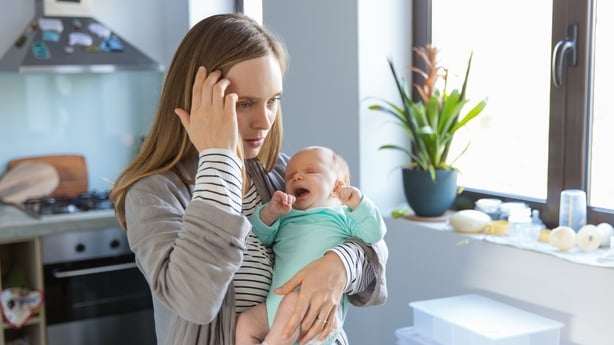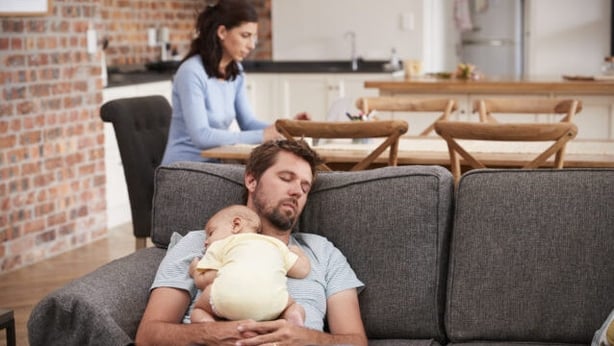According to research carried out by skincare range My Expert Midwife, most new mothers in Ireland put their own physical and emotional needs on the back burner after their babies are born.
Founded in 2017 by midwife and mum duo Lesley Gilchrist and Claire Charlton, the skincare line was created with pregnant people, new parents, and newborns in mind. When the brand officially launched in Ireland last week, co-founder and midwife Lesley Gilchrist said she hoped to kickstart a community of women across the country to support and empower one another.
"Our unique range of skincare products are carefully designed by midwives to ease the physical side effects commonly experienced during pregnancy and childbirth," she explained, "as well as offering a place of community for mums and mums-to-be, where we can talk about all things pregnancy and birth, and lift the lid on the fear of the unknown."

Research carried out by the brand revealed that women in Ireland actually receive a lot of support during their pregnancy, with plenty of information available on what to expect through the early days of morning sickness and the later stages of back pain.
However, when it comes to the transition from pregnancy to post-partum, it seems that most mums are left to scramble. We caught up with Lesley to find out more about how parents can better prepare for the so-called 'fourth trimester'.
"So much of the risk and worry surrounding pregnancy is geared around the birth", Lesley tells me over the phone. "After the birth, the risk to the baby and the mum - to a certain extent - is no longer there so people don't focus on it as much but, actually, the time when mum has to make a massive shift and adjustment to parenthood is when they need emotional support and time to physically recover."
"Birth takes an enormous toll on the body at labour, and that's if you haven't gone through a C-Section or you've got to recover from tears. You've got a lot of physical recovery to do, and the emotional adjustment is massive as well."

According to the report, three quarters of Irish mothers don't even consider making a post-birth recovery plan, with only 54% of new mums dedicating any time to themselves and their recovery in the days following the birth of a baby. And of this 54%, three quarters used this time to sleep or shower - two fairly basic human needs!
So, how much time should new mums be dedicating to recovery? A minimum of 30 minutes a day says Lesley, and feel free to tell any well-meaning but free-loading visitors to keep moving while you're at it.
"On top of everything else, you've got visitors - not the ones who will actually help and pick up housework - I mean the ones who want a chat and to hold the baby. Visitors have a huge impact on how quickly that woman can recover and how easily she can breastfeed her baby."
Speaking of housework, new parents should think about how their household will run with a baby on the scene. If you're someone who couldn't stand to have dirty dishes pile up in the sink or the pile of laundry to grow in the basket, then a plan needs to be put in place ahead of time.
Lesley suggests asking friends to come by and do a few loads of laundry or prepping some dinners in lieu of a baby present:
"Ask for this pre-natal. You might not need it, and that's fine, but if you do the support is there. It's important to keep you and your partner fed as well as the baby."

According to Lesley, women need to know that if they're suffering with post-natal depression or baby blues, or they're just so exhausted that they "accidentally open the door to the postman with a boob out", they are not alone.
"We're almost trained to believe that women nowadays can work up to the minute we give birth and be back at our desks in no time", she says. That's unrealistic, and you're setting women up to fail."
The number one thing Lesley suggest new mum's prioritise in this time? Pain relief.
"If you're in pain, you don't sleep. If you don't sleep, it takes longer to recover. Look at everything you have for pain relief: medication like Paracetamol or whatever your GP recommends, and gel pads that you can put in your freezer are also great."
"When you have given birth, get on top of the pain because it'll make your recovery more enjoyable. Pain will drag you down. You need plenty of sleep and rest during this time so have people in the house who will help support you."

Finally, Lesley recommends that new mums talk to their partners about how they can support them with a set sleep schedules. If a partner isn't available, think about recruiting a family member or hiring a doula so that you are guaranteed some time to yourself.
"One of the big reasons we made our recovery bath salts was that we could give mums a product that will physically help them recover and keep them clean but we've also put essential oils in there to help them relax."
"We have to remove the guilt for mums."

